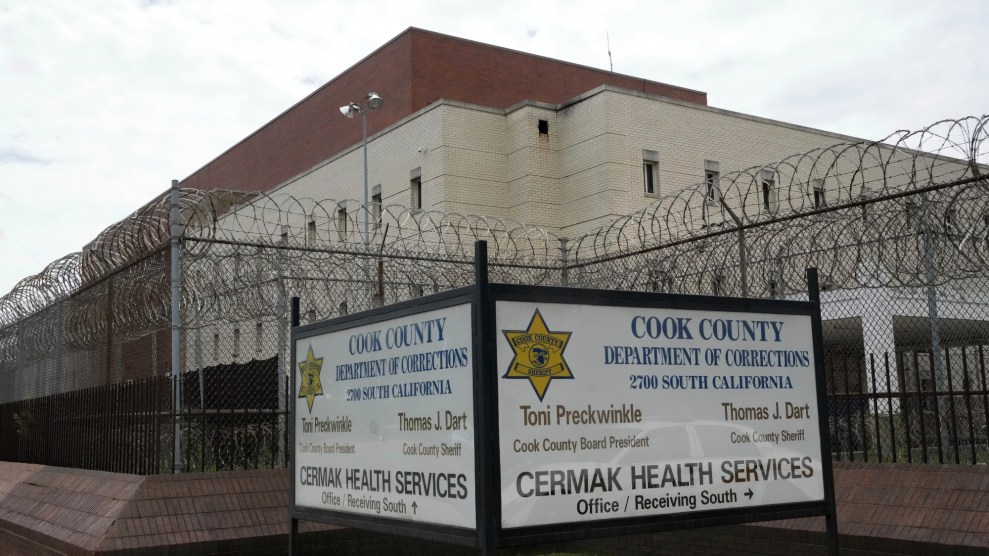The Associated Press today put out a laudatory piece on Warden Burl Cain’s program of Christian education at the Louisiana State Penitentiary at Angola. The article, which was picked up by the New York Times, San Francisco Chronicle, and dozens of other publications, is sure to advance Cain’s reputation as a great prison reformer.
The AP piece depicts Angola as a onetime den of violence and despair that has been transformed by Cain into a safe and orderly community where “everyone has a job” and where “students crowd into classrooms to study toward a college degree.” The prison’s bloody past, Cain tells the AP, was “all because of a lack of hope”–a situation the warden has treated with the dual remedy of education and redemption, in part through a degree program in Christian Ministry.
There’s another side to this story, of course, and it’s a whole lot grimmer than the AP piece would suggest. More than 90 percent of the 5,200 men Angola will die there, thanks to the states harsh sentencing policies. Much of the work on the 18,000-acre former slave plantation consists of backbreaking labor in the cotton, corn, and soybean fields, presided over by armed guards on horseback. Some inmates do not work at all because they are kept in isolation in their cells, in the prison’s notorious Camp J disciplinary unit or in long-term solitary confinement. (Among Angola’s most widely known prisoners are former Black Panthers Herman Wallace and Albert Woodfox, members of the Angola 3, who have been in solitary for more than 37 years.)
An inmate’s fate at Angola depends upon how he measures up to the warden’s standards, which are rooted firmly in his personal religious dogma. Cain believes that there is only one path toward rehabilitation, and it runs through Christian redemption. (According to Herman Wallace, Cain has at least once offered to release him from solitary if he renounced his political beliefs and accepted Jesus Christ as his savior.)
“The warden says it takes good food, good medicine, good prayin’ and good playin’ to have a good prison,” an assistant warden told Truthout in 2008, “Angola has all these.” To make sure there is ample opportunity for “good prayin’,” Cain has raised funds to construct 18 Christian chapels on the prison’s grounds. (One of several recent corruption charges against Cain involved shaking down a contractor for a donation to the prison chapel fund.)
Likewise, inmates at Angola can gain access to higher education only by embracing Cain’s brand of Christianity. According to the prison’s own web site, while Angola offers literacy and GED classes and technical training in things like auto mechanics, horticulture, and welding, the only college degree program it offers is in Christian Ministry from the New Orleans Baptist Seminary. Only a few hundred prisoners are admitted to his program.
The American Civil Liberties Union has filed lawsuits challenging some of Angola’s policies as constitutional violations of the prisoners’ freedom of religion; in one statement, the ACLU remarked: “Cain’s job is to be Warden of Angola, not the Chaplain of Angola.” But even some Christians would find Burl Cain’s vision of both human and divine justice unsavory.
A glowing 2008 article in the Baptist Press praised Cain for ”govern[ing] the massive prison on the Mississippi River delta with an iron fist and an even stronger love for Jesus.” The iron fist includes Cain’s determination to keep certain “dangerous” prisoners in lockdown, a condition that many have denouced as torture. Cain also presides over the state’s executions. The Baptist Press article noted Cain’s special dedication to delivering souls from the death chamber into the hands of Christ. When he supervised his first execution as warden, Cain said, “I didn’t share Jesus” with the condemned man, and as he received the lethal injection, “I felt him go to hell as I held his hand.” As Cain tells it, “I decided that night I would never again put someone to death without telling him about his soul and about Jesus.”
In fact, Cain will get an opportunity to put his mission into practice a few hours from now, when the state of Lousiana carries out its first execution in eight years, in the death chamber at Angola prison.
This post was written in collaboration with Jean Casella, and also appears on Solitary Watch.








